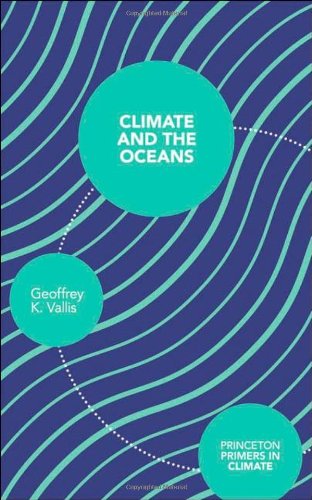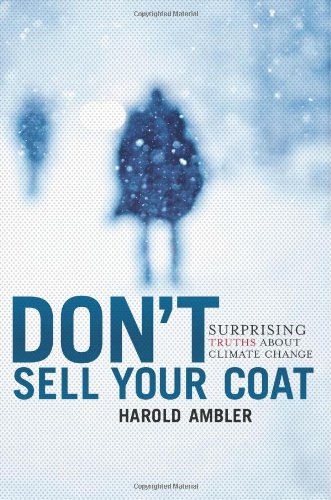Geoffrey K. Vallis – Climate and the Oceans (2011)
A quick overview of how water circulates in the oceans, (under the influence of the wind, the sun, and the coriolis force), how the oceans affects the climate, (largely by slowing down temperature changes, in both directions, and at all time scales), and how this may be affected by global warming, (nobody knows, but some of the possibilities are pretty bad).
Recommended: Weakly. Half of it is too mathematical, but the rest gives a good idea of the sort of processes that are involved.
Harold Ambler – Don’t Sell Your Coat: Surprising Truth About Climate Change (2011)
Incoherent arguments and irrelevant anecdotes, sprinkled with speculation.
Recommended: No. This is possibly the worst book of climate skepticism I’ve read so far. Some of the arguments were so idiotic that I began to wonder if it was a parody. (Did you know that if you plot the temperature changes of the last 1000 years on a Kelvin scale, there’s hardly any change at all? And that, contrary to what those climate alarmists claim, cold weather can actually be pretty dangerous?) At most it functions as a competency test. If you read it, and find the arguments plausible, then congratulations: You are not competent to have an opinion of your own on this subject. But Ambler’s leftism makes for a refreshing change. (He blames the IPCC on Thatcher.) And I like that he, like many other skeptics, is bold enough to make a testable prediction: That global cooling will begin any day now. Any day.


So far, all who have critiqued my work, yourself included, have launched ad hominem attacks, free and clear of facts.
One would think it would be a piece of cake to find factual errors in such a weak book, no? Here are some facts from my book:
1. Current interglacial, the Holocene, is the coolest of the last five (measured in Fahrenheit, Celsius, or Kelvins)
2. Holocene Optimum warmer than now, on sustained basis, as shown by boreal forest growth (in Siberia) and wave patterns in northern Greenland
3. Warming of last 150 years unremarkable during current Ice Age (that began 3 million years ago)
4. Sea level has never been stable and cannot be stable in dynamic system such as Earth’s
5. Desertification, an AGW bogeyman, is far worse during glaciation than during periods of warming (which add water vapor to the atmosphere that in turn precipitates out)
No need to list the hundreds of other facts that lead plenty of people of good will to question the dogma you hold so dear! Thank you for your review.
Hi, and thanks for replying. I am not questioning your facts as such, but the coherence of your arguments. For instance, you set up straw men such as “most people”, Al Gore, journalists and environmentalist activists, attack something stupid they believe or have said, (which is easy enough), and then you imply that you’ve somehow _also_ said something relevant about climate science.
That doesn’t follow.
For instance, you write that “in and of itself, though, videotape of glacial calving is meaningless. Yet because of such footage, any number of my environmentalist friends believe that they know in their bones that our era is one of perilous warming.”
This is of course true. A videotape doesn’t prove anything. But whatever theories climate scientists have about the growth or decline of glaciers, they’re a bit more detailed than “I saw something on a videotape once so it must be a big problem”. These theories may be wrong. But the fact that some people who are _not_ scientists have formed some belief about glaciers from watching a video, is not an argument for or against anything at all.
Nor is it an argument against the overall prediction of global warming. It’s only an argument about the ignorance of your environmentalist friends.
Your book is full of straw man arguments like this. You attack the believers, and the alarmists, but (with a few exceptions) rarely the scientists.
Personally, I don’t trust Al Gore. I don’t trust journalists. I don’t trust environmentalists. And I certainly don’t trust random people who have seen a video of glacial calving. But it _does_ seem to me that behind all this, there is solid science, performed by scientists who appreciate the difficulty of what they’re doing, and who know that there is a large amount of uncertainty involved. Like all science it needs to be criticized and corrected, which is why I applaud climate skeptics when they do a good job. For instance, checking temperature stations, as you write about, that’s fantastic. It adds data. It isn’t in itself a result – for that you need scientists – but it’s relevant.
Most of your book, however, is not relevant.
Btw, as for holding ths “dogma” dear, I don’t. I don’t like environmentalists, and I keep hoping that the skeptics will turn up some good argument against global warming. That’s partly why I am reading so many books by climate skeptics at the moment – I hope to find the best arguments the skeptics have to offer. Unfortunately, most of them are pretty bad. The best ones deal with the cost-benefit of preventing global warming, as Nigel Lawson does in his book. But the rest are not very good. Often, it seems the skeptics don’t even understand the theories they’re skeptical of, such as when they think that attacking the hockey stick will pull down the whole theory.
Your book, unfortunately, contributes to this confusion, by giving your readers easy targets to disagree with. They learn how to argue with your straw men – but very little about actual climate science.
Pingback: James Delingpole – Watermelons – How Environmentalists are Killing the Planet, Destroying the Economy and Stealing Your Children’s Future « Bjørn Stærk's Max 256 Blog
Pingback: » Intet nytt fra klimaskeptikerne
Still do not hear much in the way of refutation of facts by Bjørn Stærk or others. The facts (undisputed) are that the planet warms and cools naturally, that it has been warm before, that Antarctic ice is increasing (are these not facts?), that Greenland was once warm, and Europe, and there are many other facts inconsistent with man caused global warming. (Doesn’t really matter that Ambler points out, anecdotally, how the public has been hoodwinked, using media examples, he has a right to address that issue for his readers. If fact he must, to be credible). At the very least, climate alarmists would, if honest, punctuate their whole theory with a big question mark, instead of saying “the science is settled.” And why is it they suddenly object so to Ambler, who uses common sense, when they have not condemned all the bad science, fraud, and hoaxing by global warming “scientists?”